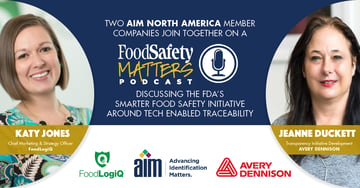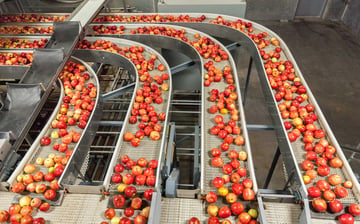Earlier this week, FoodLogiQ had the pleasure of attending and speaking at GFSI’s annual Global Food Safety Initiative (GFSI) Conference, hosted virtually this year. Hundreds of delegates and speakers from leading brands and organizations across the globe met to discuss the evolution, state and future of food safety between March 23 and 25. Known as one of the world’s most important conversations around food safety, the 2021 GFSI Conference focused on the theme “Food Safety: Rethink, Reset, Recharge,” and featured a wide range of sessions showcasing how each of these elements has been critical to the state of food safety, especially through the supply chain disruption brought on by COVID-19.
GFSI Director Erica Sheward accurately summarized the main themes of the conference, among them "trust, transparency, collaboration and respecting everyone’s views, even when we don’t all agree. We are all here for the same thing: safe food for everyone." Across the conference’s three-day span, conversations centered on a variety of topics, from stories of leadership and resilience, to technological evolution and innovation in the supply chain, building trust in the post-pandemic world, the vanguard of food safety and the latest in food safety solutions.
Talking Food Tech with FoodLogiQ
As part of GFSI’s Tech Talk series, FoodLogiQ Chief Operating Officer Katy Jones and Food Safety Solutions Engineer John Paul (JP) Gutierrez led a session on digitized and tech-enabled auditing, titled “Executing Tech-Enabled Audits in a Post-COVID World.” The duo discussed how, since the onset of the COVID-19 pandemic, methods for executing food safety audits have largely shifted, and with them, a reliance on hybrid, digital formats has emerged. Furthermore, in a New Normal and a New Era of Smarter Food Safety, tech-enabled auditing has become a central component of modern food safety compliance. Jones and Gutierrez also presented key strategies for executing tech-enabled audits through FoodLogiQ Connect to mitigate risk, uphold compliance and deliver on brand promise.
“We discuss how to execute tech-enabled audits and how technology can support driving efficiency in the auditing practice that you need for your company. We also show a demo of our product Manage + Monitor, which helps support a wide variety of food safety audits, from GFSI to BRC to SQF, and a variety of other assessments that you may have for your supplier base, as well,” says Jones. She explains that, during the past year especially, technology has helped support the auditing practice and supplement previous approaches, which has led to greater efficiency, led to additional insights and driven action. “We often see audits still being heavily paper-based; we’re pushing for the digitization of that – and then what you can do with the collection of that data to get more into a proactive approach to food safety.”
FoodLogiQ’s Top 5 Conference Takeaways
FoodLogiQ’s Tech Talk session speaks to one of the key takeaways from the GFSI conference: “You measure what matters.” The latter rings true in relation to the crucial themes of transparency, trust and collaboration, as well as to the power in making informed, data-driven decisions that drive action and proactively ensure food safety.
Below, review the FoodLogiQ team’s five key takeaways from the 2021 GFSI Conference:
-
- You measure what matters. Eric Moore, Director of Food Safety and Regulatory Compliance at Testo North America, made this affirmation during the session Operational Efficiency: Maximizing Food Safety Management in the 21st Century. As learned through the disruption brought on by COVID-19, the sense of risk has changed throughout the food industry, and will continue to do so. This invites the opportunity to embrace ongoing advancement in the technology industry, go deeper into analysis and be proactive, such as with supplier management (and auditing, in particular). And a reminder that good and valid data is important.
- Technology adoption is the way of the future, especially towards consumer interests. Also gleaned from the Testo session, this takeaway underlines the importance of embracing digitization in the modern world of food safety and consumer trust. New technologies, such as RFID technology for capturing Critical Tracking Events (CTEs), are continually evolving and expanding, especially in the New Era of Smarter Food Safety. It’s important to mention, in addition, that the adoption of standards, ridding of bad data and prioritization of interoperability are essential, foundational elements to the future of food safety.
- It’s all about trust. In Doing the Right Thing: Food Safety Trust and Transparency, Christopher Hodges Obe, Professor of Justice Systems and Head of the Swiss Research Programme on Civil Justice Systems, Centre for Socio-Legal Studies, and Helen Leurent, Director General at Consumers International, explained that consumers need to believe that a brand will be trustworthy. It only takes one incident to destroy consumer brand trust, and it’s essential for brands to do the right thing to ensure customers’ safety. It’s important to consider what you need to build trust, to commit to openness, transparency and fairness, and to utilize reliable, dependable evidence. In the future, safety will equal sustainability.
- It’s essential to communicate trust to the consumer. This was a central takeaway from the session Bridging the Food Safety Gap: Turning Corporate Efforts Into Consumer Confidence, featuring Luca Crisciotti, DNV CEO of Supply Chain & Product Assurance, and John Carter, Ferrero Area Europe Quality Director. It’s important for food companies to reflect on what they need to communicate trust and transparency towards consumers. And there are three things to look out for: moving from a static to a dynamic, consistent environment, embracing and refining process through technology, and providing visibility into a product’s journey through the supply chain.
- All consumers and home cooks have become food technologists. As discussed in How New Traceability Regulations Will Ignite Supply Chain Digitization, it’s important to acknowledge the awareness and knowledge of today’s consumers. In fact, the consumer is becoming increasingly more knowledgeable on food safety than ever before. And food safety is no longer only about supplying safe, good quality food – the industry should strive towards the goal of providing the public with true transparency around what they are consuming. Participation and collaboration are key, as are the adoption of standards, healthy trading partner relationships and proactive supplier management.
Tag(s):
Other posts you might be interested in
View All Posts
Traceability
3 min read
| January 16, 2020
Food Safety Matters: Partnering on Food Traceability and Transparency
Read More
Trustwell News
6 min read
| December 17, 2021
FoodLogiQ Connect Surpassing 100 Million Critical Tracking Events
Read More
Food Industry
3 min read
| February 26, 2020

